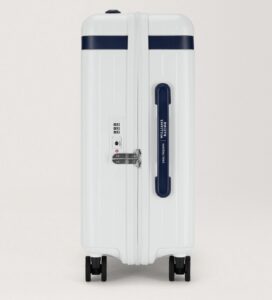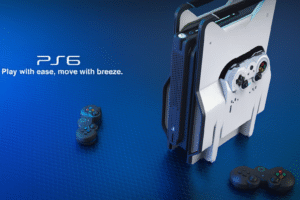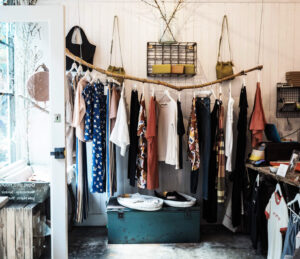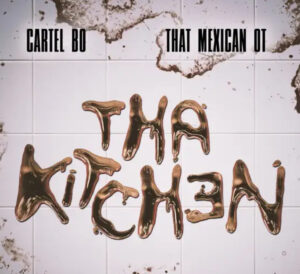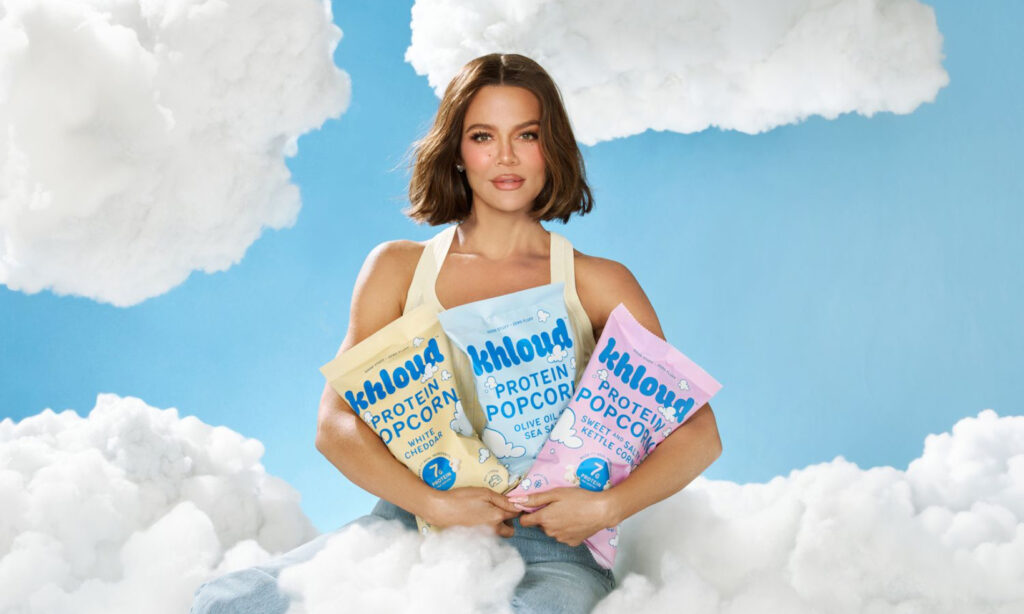
In a culture increasingly obsessed with the quantifiable—steps walked, calories counted, macros calculated—it was almost inevitable that snacks would be the next frontier of functionalism. This week, the landscape of “performance eating” found its newest emblem in a name as synonymous with influence as it is with ambition: Khloé Kardashian.
The reality television star, entrepreneur, and longtime fitness advocate officially unveiled her latest venture: Khloud Protein Popcorn. It’s not merely another celebrity-branded treat; it’s a carefully calibrated response to a culture that demands more from every bite. In a world where your average beverage now promises brain support, gut health, and anti-aging miracles, popcorn, too, has undergone its protein renaissance.
At a moment when “high-protein” labels are slapped on everything from sparkling water to salad dressings, Khloud arrives not just as a product but as a commentary on the evolving relationship between food, identity, and aspiration.
The Promise of Khloud: More Than Just Popcorn
On the surface, Khloud Protein Popcorn is simple enough: air-popped kernels dusted with a proprietary “Khloud dust”—a blend of seasonings and milk protein powder that elevates the humble snack to a veritable macro marvel. Each serving offers 7 grams of protein, eclipsing the totals found in traditional “healthy” popcorns like SkinnyPop or LesserEvil, both of which hover around 2 grams or fewer.
Khloud’s protein payload even outstrips Jack Link’s Beef Stick—the stalwart of gas station snack aisles—which clocks in at a mere 5 grams per serving.
The product launches in three initial flavors designed to straddle the line between health halo and pure pleasure:
- White Cheddar, for the savory traditionalist
- Olive Oil and Sea Salt, for the minimalist wellness purist
- Sweet and Salty Kettle Corn, for the indulgent seeker of “balanced” treats
Wrapped in soft pastel packaging, the bags themselves are laden with the wellness vocabulary of our times: “non-GMO,” “seed-oil free,” and, most importantly, “high-protein”—the buzziest buzzword of all.
Khloud isn’t just selling popcorn.
It’s selling a lifestyle: a snack you can eat without regret, one that supports the notion that every small choice inches you closer to your best, strongest, most aesthetically optimized self.
The Proteinization of Everything
Khloé’s foray into functional snacking didn’t happen in a vacuum. Protein—once relegated to gym rats and bodybuilders—has officially gone mainstream, reshaping the grocery landscape in its image.
Protein water. Protein ice cream. Protein pasta.
Even protein-enhanced condiments like ketchup and barbecue sauce are fighting for shelf space.
The macro-mania is fueled in part by social media’s micro-dissecting gaze. Fitness influencers peddle protein pancakes. TikTok health trends deify “high-protein everything.” Amazon search results are dominated by “best protein snack” queries.
Behind this lies a curious contradiction: most adults already consume sufficient protein in their daily diets, according to registered dietitians and medical experts. The Recommended Dietary Allowance (RDA) for adults is 0.8 grams per kilogram of body weight, a target easily met with even moderate consumption of typical foods.
Yet, perception has trumped practicality. Protein has become more than a nutrient; it is a virtue signal, shorthand for discipline, strength, and control.
Complicating the phenomenon is the meteoric rise of GLP-1 weight loss drugs like Ozempic and Wegovy. As increasing numbers of users experience rapid fat loss—and, unfortunately, muscle atrophy—the emphasis on muscle preservation through protein has intensified. High-protein diets are seen not only as a tool for fat loss but for body composition management in the era of pharmaceutical weight control.
Enter Khloud Protein Popcorn: a snack engineered to serve both psychological and biological hungers.
Khloud’s Strategic Positioning: Wholesome Indulgence
Khloé Kardashian’s career has long been tied to physical transformation narratives: from her fitness journey to her Good American denim empire, she has built a brand around empowerment-through-improvement. Khloud fits seamlessly into this persona.
Yet Khloud’s genius lies in a subtler trick: it positions itself as an indulgence you don’t have to apologize for.
In a world riddled with dietary shame cycles—“clean eating” versus “cheat days,” “good foods” versus “bad foods”—Khloud offers escape without betrayal. It taps into the deep, often unspoken yearning for permission: permission to snack, to savor, to nourish, all in one handful.
The pastel aesthetic, echoing millennial pinks and muted mints, softens the edges of the brand’s aggressive functionalism. The messaging flutters between fitness influencer lingo and cozy self-care mantras, walking a tightrope between aspiration and accessibility.
In other words, Khloud isn’t wagging a finger at your cravings. It’s linking arms with them—and leading them to the protein aisle.
A Crowded Market, A Distinctive Edge
While protein-enhanced snacks are hardly a novelty in 2025, few have successfully captured the lifestyle branding magic that the Kardashians have historically mastered.
SkinnyPop and LesserEvil offer “better-for-you” propositions, but their focus remains heavily on calorie reduction and “clean labels.”
Khloud, by contrast, leans into empowerment marketing: Eat more. Be more. Build strength, not just a smaller waistline.
This shift mirrors larger consumer trends. Millennials and Gen Z shoppers—key demographics for both Khloé’s personal brand and Khloud’s target audience—have increasingly rejected diet culture’s restrictive frameworks. They don’t just want to eat less; they want to eat smarter, perform better, and feel stronger.
Functionality, not deprivation, is the new north star.
Khloud’s protein superiority over competitors gives it an immediate talking point. Its clean label claims (“seed-oil free,” “non-GMO”) further insulate it from critiques by the ever-watchful eyes of health-conscious social media.
And, crucially, Khloé’s direct involvement offers an authenticity halo.
This isn’t a sloppily licensed celebrity deal. It’s an extension of a persona meticulously built on body transformation, resilience, and empowerment.
The Future of Functional Snacking
Khloud Protein Popcorn’s launch signals a broader movement in food marketing: the era of casual functionalism.
Where once function-focused foods were siloed to niche health stores and bodybuilding forums, now they infiltrate everyday snack categories. Tomorrow’s grocery aisles will not merely be divided by sweet and savory, but by function: gut health chips, nootropic chocolates, electrolyte brownies.
Khloud’s success—or failure—will hinge not just on its flavor profiles or its protein count, but on its ability to embed itself in the rituals of modern eating. Afternoon desk snack. Post-gym nibble. Late-night Netflix treat.
If it succeeds, Khloud will mark not just a savvy brand extension for Khloé Kardashian, but a milestone in how food itself is conceived—not as mere sustenance or pleasure, but as personal optimization disguised as indulgence.
In this new world, every kernel, every crumb, carries a promise:
Eat this, and be better.
Closing Reflections: Popcorn with a Purpose
As Khloud Protein Popcorn hits shelves next Tuesday, it arrives at the perfect cultural intersection of wellness, indulgence, and ambition.
It’s a snack for the macro-counters, the wellness warriors, the post-diet culture survivors, and the casual grazers who still want a little extra edge. It’s both a nod to the simple pleasure of movie-night popcorn and a wink at the sophisticated calculations of 2025’s health-obsessed consumer.
And in typical Kardashian fashion, it’s more than just a product launch.
It’s a mirror, reflecting our collective hunger—not merely for snacks, but for transformation itself.
No comments yet.


